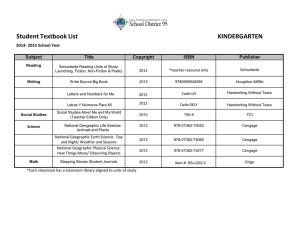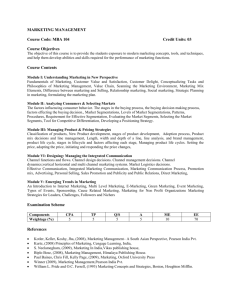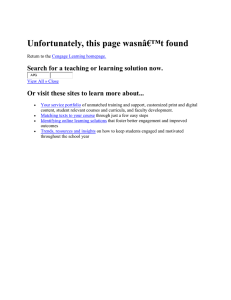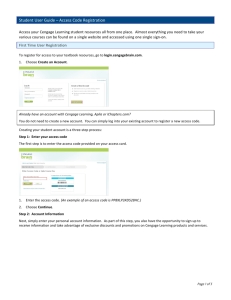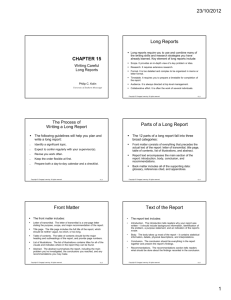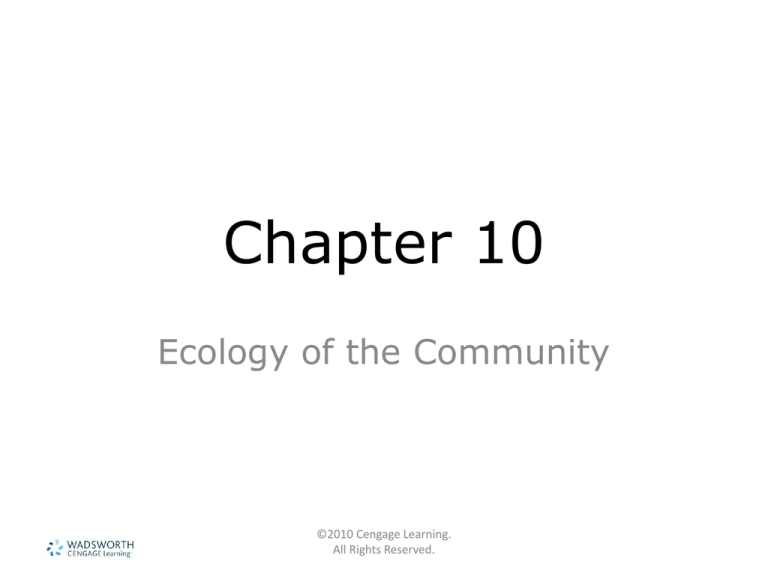
Chapter 10
Ecology of the Community
©2010 Cengage Learning.
All Rights Reserved.
No man is wise enough by
himself.
Titus Maccius Plautus
©2010 Cengage Learning.
All Rights Reserved.
Community:
Structure/Functions
©2010 Cengage Learning.
All Rights Reserved.
Community
• A group of people living in the same
geographic area (neighborhood,
town, or city) under common laws
• A group of people sharing fellowship,
a friendly association, and common
interests
©2010 Cengage Learning.
All Rights Reserved.
Five Functions
•
•
•
•
•
Production, distribution, consumption
Socialization
Social control
Social participation
Mutual support
©2010 Cengage Learning.
All Rights Reserved.
The Community’s
Influence on
Socialization
©2010 Cengage Learning.
All Rights Reserved.
Community
• The community is a socializing agent
because it is where children learn the
role expectations for adults as well
as for themselves.
©2010 Cengage Learning.
All Rights Reserved.
Socialization Methods
•
•
•
•
Modeling by adults
Values and norms instilled in children
Enforcement of rules
Serving as a context in which
children can “try out” behavior and
experience consequences
©2010 Cengage Learning.
All Rights Reserved.
Physical Factors
•
•
•
•
Population density and composition
Noise
Arrangement and types of houses
Play settings
– Traditional
– Modern
– Adventure
©2010 Cengage Learning.
All Rights Reserved.
Interaction Patterns
• Gemeinschaft
– Communal, cooperative, close, intimate,
and informal interpersonal relationships
• Gesellschaft
– Associative, practical, objective, and
formal interpersonal relationships
©2010 Cengage Learning.
All Rights Reserved.
The Community as a
Learning
Environment
©2010 Cengage Learning.
All Rights Reserved.
The Community as a
Support System
©2010 Cengage Learning.
All Rights Reserved.
Community Agencies
Public
Private
Families
Combination
©2010 Cengage Learning.
All Rights Reserved.
Community Services
• Preventive
– Seek to lessen the strains of everyday
life
• Supportive
– Seek to maintain the health, education,
and welfare of the community
• Rehabilitative
– Seek to enable or restore individuals’
ability to participate in the community
©2010 Cengage Learning.
All Rights Reserved.
©2010 Cengage Learning.
All Rights Reserved.
Creating Caring
Communities
©2010 Cengage Learning.
All Rights Reserved.
Programs for Families
•
•
•
•
Economic Assistance
Health Care
Social Support
Special Child-Care Services
©2010 Cengage Learning.
All Rights Reserved.
Economics
• One in six children in the United
States lives in poverty.
• These families have incomes below
the federally designated poverty
guideline.
• Families with children are the fastest
growing segment of Americans who
are homeless.
©2010 Cengage Learning.
All Rights Reserved.
Economic Programs
• Temporary Assistance for Needy
Families (TANF)
• Unemployment compensation
• Social security survivor or disability
benefits
• Supplemental security income
• Veterans’ benefits
• Child nutrition services
©2010 Cengage Learning.
All Rights Reserved.
Social Support
• Child welfare services
• Social services block grants
• Child and adolescent service system
programs
• Income tax deductions
• Subsidized day care
©2010 Cengage Learning.
All Rights Reserved.
Mesosystem
Influences
©2010 Cengage Learning.
All Rights Reserved.
Mesosystem
• Community services, such as childcare, should link with other health,
nutrition, social services, and
educational programs.
• Head Start is an example of a
program with a comprehensive set of
service linkages.
©2010 Cengage Learning.
All Rights Reserved.
Involvement and
Advocacy
©2010 Cengage Learning.
All Rights Reserved.
Advocacy: Examples
• Children’s Defense Fund
• Child Welfare League of America
• National Congress of Parents and
Teachers
©2010 Cengage Learning.
All Rights Reserved.
Abusive Families
• Main goal for services:
– Improve the relationship between
parents and children in order to prevent
further maltreatment
• Strategies:
– Support
– Prevention
©2010 Cengage Learning.
All Rights Reserved.

